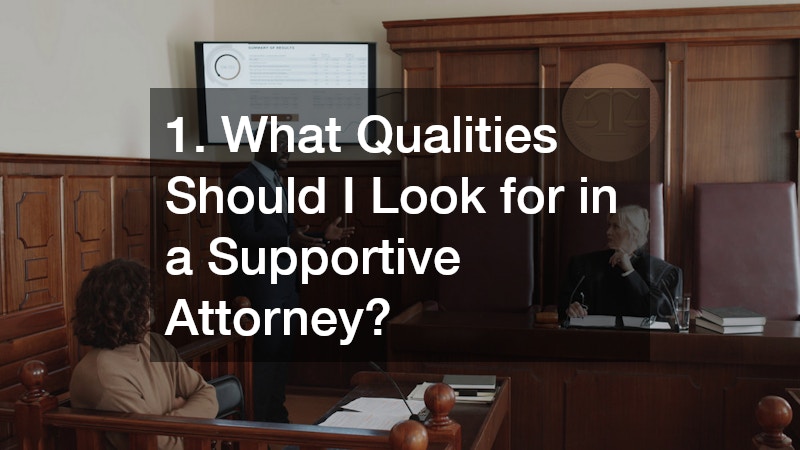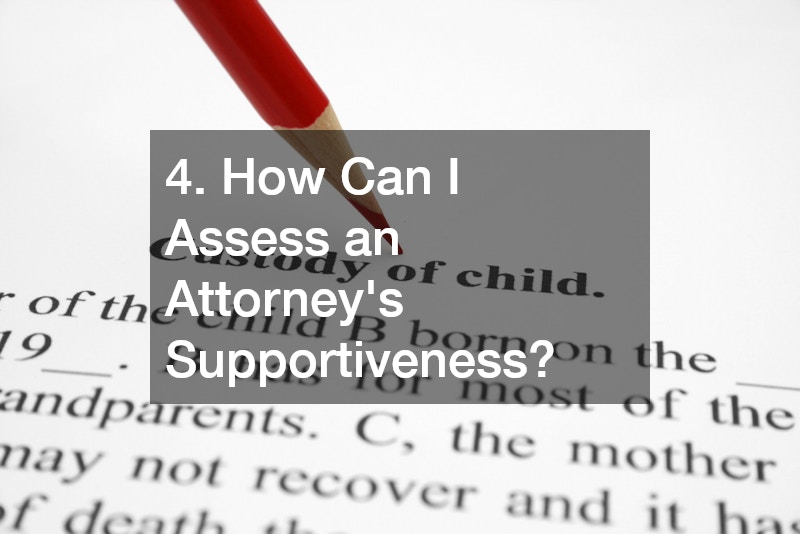In today’s complex and often challenging legal landscape, ensuring the protection of your family’s interests and rights is more crucial than ever. A supportive attorney can play a vital role in safeguarding your family’s future, providing not just legal expertise but also guidance and emotional support. Whether you are dealing with family law issues, immigration matters, or estate planning, having a reliable legal advocate can make a significant difference. This article delves into the essential qualities to look for in a supportive attorney, presenting ten key questions and considerations to guide you in making an informed decision.
1. What Qualities Should I Look for in a Supportive Attorney?

Choosing the right attorney involves more than just evaluating their legal prowess. A supportive attorney should possess empathy and understanding, ensuring clients feel heard and respected throughout the legal process. Many legal matters can be deeply personal and emotionally charged, so having an attorney who approaches situations with compassion can make the experience less overwhelming. Trustworthiness is another essential quality, as clients need to feel confident that their attorney will act in their best interests without any hidden agendas or conflicts.
Communication skills are crucial, especially when dealing with complex legal issues where clarity and transparency are paramount. A supportive attorney should be able to explain legal jargon in a way that is easily understood by clients, empowering them to make informed decisions. Additionally, it is beneficial if they demonstrate patience and adaptability, adjusting their approach based on the unique needs of each client, whether that involves more frequent updates, extra explanations, or emotional reassurance.
Finally, experience in relevant legal areas should not be overlooked. For example, a foreclosure law firm focuses on preventing clients from losing their homes, while family immigration lawyers assist those seeking to navigate the complexities of immigration. These examples illustrate how specialized knowledge directly impacts the quality of guidance offered. Ensuring your attorney has a solid background in the specific area of law relevant to your needs can significantly enhance the support they provide, leading to more effective strategies and stronger outcomes.
2. How Do I Begin My Search for a Supportive Attorney?
Starting your search for a supportive attorney can seem daunting, but a structured approach can ease the process. Initial research should include asking for recommendations from trusted friends and family who have faced similar legal issues. Recommendations can provide insight into the attorney’s demeanor, approach, and ability to provide support.
Additionally, online resources can offer valuable information when searching for a supportive attorney. Websites and legal directories provide details about attorneys, their specializations, and client testimonials. Engaging with community forums or legal advice platforms can also aid you in finding attorneys well-versed in relevant areas such as family law or estate planning.
Another effective method is reaching out to local attorneys‘ bar associations for referrals. They often maintain a roster of attorneys by specialty and can direct you to professionals with specific expertise. Whether you need a family immigration lawyer or a divorce lawyer, these associations can be an invaluable resource for connecting you with a supportive attorney who matches your needs.
3. What Questions Should I Ask in a Consultation?
Initial consultations provide a critical opportunity to assess whether an attorney is both capable and supportive. One should inquire about the attorney’s experience with cases similar to yours, particularly if an estate attorney is needed for matters like will preparation or trust management. This helps determine their capability to handle your specific legal needs.
It’s also imperative to ask about their approach to maintaining communication and managing client expectations. A supportive attorney should outline how frequently they will update you and what communication methods they prefer. Clarity on these processes can prevent misunderstandings and ensure smooth collaboration.
Lastly, discussing fee structures and billing practices upfront can prevent potential conflicts. Understanding exactly how an attorney charges — whether it’s a flat fee or an hourly rate — is crucial. This transparency reflects the attorney’s integrity and their understanding of the importance of financial clarity for clients.
4. How Can I Assess an Attorney’s Supportiveness?

Evaluating an attorney’s supportiveness involves observing their interpersonal skills during consultations. Are they genuinely listening to your concerns and demonstrating empathy? Family law attorneys often need to balance legal acumen with empathy, as they deal with emotionally charged situations. Look for signs of genuine interest and compassion.
Another indicator is the attorney’s willingness to personalize their legal approach to your family’s unique circumstances. A supportive attorney will inquire about your goals and tailor their strategies accordingly. This tailored approach indicates a commitment to the client’s best interests rather than adopting a one-size-fits-all strategy.
Trust your instincts and assess whether the interaction feels comfortable and respectful. An attorney who is dismissive or avoids providing specific answers may not be the supportive advocate you need. When in doubt, consider seeking feedback from past clients to gauge whether the attorney possesses the supportiveness you’re seeking.
5. Does the Attorney’s Reputation in the Community Matter?
An attorney’s reputation within the community can provide valuable insight into their practices and ethical standards. A highly respected divorce lawyer, for instance, would likely have a track record of handling cases with discretion and success, which is essential in sensitive situations.
Engaging with community feedback, such as client testimonials or online reviews, can give an idea of how the attorney is perceived locally. Positive feedback reinforces their ability to support clients effectively and maintain a high standard of professionalism. Conversely, consistent negative feedback might be a red flag to explore further.
Additionally, an attorney’s involvement in community initiatives or local legal associations can also speak volumes. Attorneys who actively contribute to their communities are more likely to understand local nuances and be invested in maintaining a good reputation. This active involvement often signifies a dependable and supportive character.
6. How Important is an Attorney’s Track Record of Success?
An attorney’s track record of success is crucial in evaluating their capability as a supportive advocate. A social security attorney with a high success rate, for example, demonstrates proficiency in navigating complex systems to achieve favorable outcomes for clients.
Reviewing case outcomes can paint a picture of the attorney’s effectiveness and dedication to their clients. This information can often be obtained through public records or directly from the attorney. Transparency about past successes and failures indicates confidence and integrity in their legal practice.
Keep in mind that while success rates are important, they should not be the sole factor. A supportive attorney should balance between winning cases and providing ethical, compassionate support. This combination ensures that legal victories do not come at the cost of client trust and satisfaction.
7. Should I Consider the Attorney’s Specialization in Family Law?

Specialization in family law is a crucial factor when seeking a supportive attorney, particularly when dealing with complex familial issues. Family law encompasses a wide range of legal matters, from custody battles to adoption, and requires a deep understanding of the law coupled with sensitivity to personal and emotional facets. Because these cases often involve children, finances, and delicate personal relationships, having an attorney who can navigate both legal and emotional dynamics is essential.
Local attorneys who specialize in family law tend to have extensive experience dealing with the courts and systems pertinent to familial disputes. Their familiarity with these processes can expedite resolutions and reduce stress for the client. They also understand local judges’ preferences and procedural nuances, which can make a significant difference in outcomes. The specialized skills of family law attorneys are indispensable when addressing multifaceted family legal issues.
An attorney specialized in family law will likely be more adept at crafting strategies tailored to the specific legal standards of the area. Beyond legal expertise, they can provide guidance on mediation, counseling, and alternative dispute resolution, offering clients options that may minimize conflict. This focus enhances their ability to be a supportive and effective advocate for your family’s needs while ensuring solutions are both legally sound and emotionally sustainable.
8. What Role Does Attorney Communication Play in Finding a Supportive Attorney?
Effective communication is a cornerstone of a supportive attorney-client relationship. Without clear, consistent communication, even the most legally adept personal injury lawyer might fail to adequately support their clients. An attorney should be able to clearly explain legal strategies, potential outcomes, and any risks involved. Complex legal jargon should be broken down into terms that clients can easily understand, ensuring they feel empowered and not overwhelmed.
Regular updates from your attorney can prevent confusion and foster a relationship built on trust. A supportive attorney will ensure that their clients are informed about any developments and are always aware of the next steps in the process. This proactive communication style can alleviate stress, provide reassurance, and help clients feel more in control during what can often be an uncertain time.
Listening is equally as important as conveying information. An attorney who listens actively to client concerns can accommodate special requests or address specific worries. This interactive form of communication reinforces the attorney’s supportiveness and dedication to providing service tailored to client needs. Moreover, when attorneys validate their clients’ emotions and perspectives, it fosters a sense of respect and collaboration that strengthens the partnership over time.
9. Are there Particular Red Flags to Watch for During the Search?
Being vigilant of red flags during your search for an attorney is vital. Warning signs might include an attorney with a suspiciously low fee structure, which could indicate inexperience or a lack of professionalism. An experienced accident lawyer, for instance, would charge fees reflective of their expertise and the complexity of the case. A fee that seems “too good to be true” often is, and it may result in subpar representation that could ultimately cost you more in the long run.
Another red flag is an attorney who makes grandiose promises of success without backing their claims with a track record or logical strategy. Legal outcomes can be uncertain, and a supportive attorney should be honest about potential challenges. Unrealistic guarantees can be a sign of exploitation rather than genuine support, and they may indicate someone who is more interested in securing a client than in providing quality legal advocacy.
High-pressure sales tactics or reluctance to provide clear fee structures are also concerning. A criminal defense lawyer, or any legal professional, should respect your decision-making process and be transparent about costs. Additionally, pay attention to responsiveness—if an attorney consistently fails to return calls or emails promptly, this may foreshadow poor communication throughout your case. An attorney unwilling to provide clarity or accessibility may not have your best interests at heart, making it all the more important to proceed with caution.
10. How Can I Maintain a Good Relationship with My Attorney?

Once you have engaged a supportive attorney, maintaining a harmonious working relationship is essential. Consistent and open communication ensures that expectations are aligned and misunderstandings minimized. A respectful approach where both parties feel comfortable expressing concerns can strengthen the relationship further. Being honest and forthcoming with information is equally important, as withholding details can hinder your attorney’s ability to represent you effectively.
It is also helpful to adhere to the timelines and requests set forth by your attorney in the pursuit of your legal goals. A cooperative approach helps the attorney handle your case efficiently and fosters goodwill. By meeting deadlines, providing requested documents, and being prepared for meetings, you contribute to a more seamless legal process and demonstrate reliability as a client.
Mutual respect is the foundation of a lasting attorney-client relationship. Acknowledging your attorney’s expertise while clearly communicating your own needs can ensure a balanced partnership. This dynamic, built on respect, trust, and collaboration, can result in a fruitful legal relationship that benefits all involved, ultimately leading to better legal outcomes.
Finding a supportive attorney who understands and aligns with your family’s legal needs is a crucial step toward ensuring peace of mind and protection. This article has outlined ten essential questions and considerations to help you identify the right legal advocate for your family. By carefully evaluating qualities, assessing communication, and remaining vigilant for potential red flags, you can build a strong, trusting relationship with a supportive attorney who will stand by your side throughout legal processes.




